Content for TS 23.067 Word version: 18.0.0
11.6 Overview of call related signalling p. 16
In this overview, the message structure to implement the specified concept is identified, and brief details are given of each message.
A diagrammatic representation of the transport procedures to be used to carry the priority information in case of standard point-to-point calls are given in Figures 1 to 6. The message flow is not represented completely.
The corresponding message flows in case of voice group calls or voice broadcast calls are given in TS 43.068 and TS 43.069, respectively.
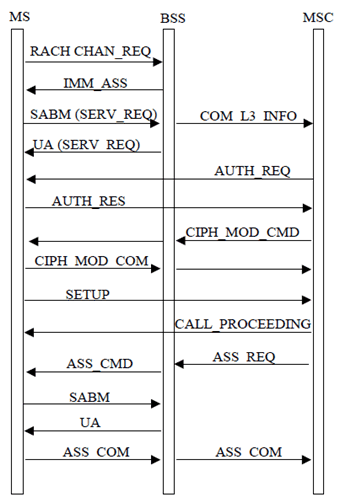
Figure 2: Signalling information required for the prioritisation at mobile originating call establishment without fast call set-up (for GSM)
(⇒ copy of original 3GPP image)
(⇒ copy of original 3GPP image)
Initial RACH CHAN_REQ:
Standard message.
IMM_ASS:
Standard message.
SABM (SERV_REQ):
Modified form of the current L3-MM CM SERVICE REQUEST where the priority level is provided in addition if a priority selection is performed by the user. In case of no priority selection or use of a non-compatible Mobile Station the Mobile Station shall send a standard service request message and the network shall apply a default priority to their request.
UA (SERV_REQ):
Standard message.
COM_L3_INFO:
The MSC is provided with initial information about the requested service together with the selected priority level if applicable.
AUTH_REQ:
Standard message.
AUTH_RES:
Standard message.
CIPH_MOD_CMD:
Standard message.
CIPH_MOD_COM:
Standard message.
SETUP:
Standard message.
CALL_PROCEEDING:
The network shall include the assigned priority level in a CALL_PROCEEDING message when the network supports priority.
ASS_REQ:
This message is sent from the MSC to the BSC including the call priority and pre-emption capability to be applied as defined in TS 48.008, according to the priority information the MSC has obtained from the service request or from the VLR data. In addition, the eMLPP level is included as explicit information.
ASS_CMD:
Standard message.
SABM:
Standard message.
UA:
Standard message.
ASS_COM:
Standard message.
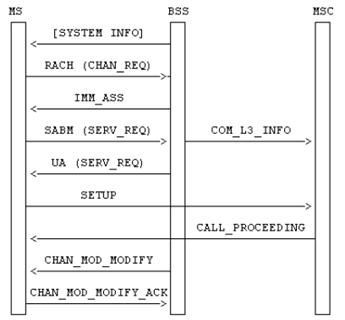
Figure 3: Signalling information required for the prioritisation at mobile originating call establishment with fast call set-up (for GSM)
(⇒ copy of original 3GPP image)
(⇒ copy of original 3GPP image)
SYSTEM INFO:
Initial RACH CHAN_REQ:
The network may provide information on the BCCH system information, that a MM connection is provisional granted after establishment of the main signalling link.
If such information is provided on the BCCH and the user has selected a fast call set-up, the Mobile Station shall immediately send a SETUP message to the network after the main signalling link is established.
Standard message.
IMM_ASS:
Standard message.
SABM (SERV_REQ):
Modified form of the current L3-MM CM SERVICE REQUEST where the priority level is provided in addition if a priority selection is performed by the user.
UA (SERV_REQ):
Standard message.
COM_L3_INFO:
The MSC is provided with initial information about the requested service together with the selected priority level if applicable.
If the network itself decides not to perform ciphering, it shall send an CM_SERV_ACC message.
SETUP:
Standard message.
CALL_PROCEEDING:
The network shall include the assigned priority level in a CALL_PROCEEDING message when the network supports priority
ASS_REQ:
This standard message is sent from the MSC to the BSC including the call priority and pre-emption capability to be applied as defined in TS 48.008, according to the priority information the MSC has obtained from the service request or from the VLR data. In addition, the eMLPP level is included as explicit information.
CHAN_MOD_MODIFY:
Standard message.
CHAN_MOD_MODIFY_ACK:
Standard message.
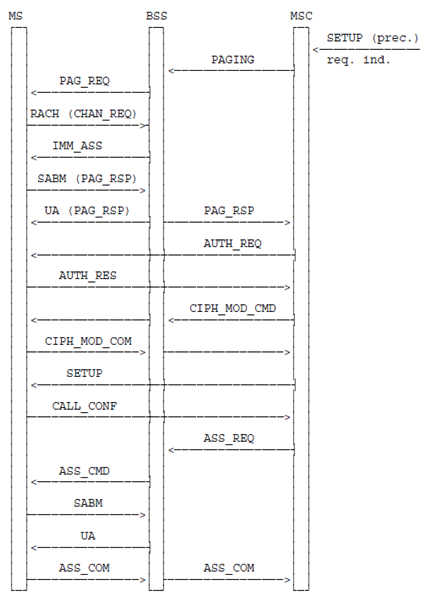
Figure 4: Signalling information required for the prioritisation at mobile terminating call establishment without fast call set-up and without called-party pre-emption (for GSM)
(⇒ copy of original 3GPP image)
(⇒ copy of original 3GPP image)
SETUP (prec.) req. ind.:
In addition to the basic call requirements, the contents of the set-up information flow shall contain the information on the requested MLPP priority level.
PAGING:
Modified paging command including the priority level to be applied.
PAG_REQ:
Modified paging message including the related priority level.
Initial RACH CHAN_REQ:
Standard message.
IMM_ASS:
Standard message.
SABM (PAG_RSP):
Standard message.
UA (PAG_RSP):
Standard message.
PAG_RSP:
Standard message.
AUTH_REQ:
Standard message.
AUTH_RES:
Standard message.
CIPH_MOD_CMD:
Standard message.
CIPH_MOD_COM:
Standard message.
SETUP:
Standard message.
CALL_CONF:
Standard message.
ASS_REQ:
This standard message is sent from the MSC to the BSC including the call priority and pre-emption capability to be applied as defined in TS 48.008, according to the priority information the MSC has obtained from the incoming set-up message. In addition, the eMLPP level is included as explicit information.
ASS_CMD:
Standard message.
SABM:
Standard message.
UA:
Standard message.
ASS_COM:
Standard message.
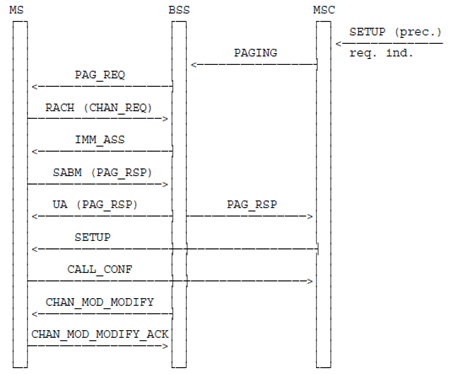
Figure 5: Signalling information required for the prioritisation at mobile terminating call establishment with fast call set-up and without called-party pre-emption
(⇒ copy of original 3GPP image)
(⇒ copy of original 3GPP image)
SETUP (prec.) req. ind.:
In addition to the basic call requirements, the contents of the set-up information flow shall contain the information on the requested MLPP priority level.
PAGING:
Modified paging command including the priority level to be applied.
PAG_REQ:
Modified paging message including the related priority level.
Initial RACH CHAN_REQ:
Standard message. A new establishment cause shall be provided to indicate the requirement for the direct assignment of a TCH (very early assignment) for the support of fast call set-up procedure.
IMM_ASS:
Standard message.
SABM (PAG_RSP):
Standard message.
UA (PAG_RSP):
Standard message.
PAG_RSP:
Standard message.
For fast call set-up the network shall immediately send a SETUP message to the Mobile Station. Authentication and ciphering may not be performed or delayed by the network.]
SETUP:
Modified message with an indication of the priority level.
CALL_CONF:
Standard message.
ASS_REQ:
This standard message is sent from the MSC to the BSC including the call priority and pre-emption capability to be applied as defined in TS 48.008, according to the priority information the MSC has obtained from incoming set-up message. In addition, the eMLPP level is included as explicit information.
CHAN_MOD_MODIFY:
Standard message.
CHAN_MOD_MODIFY_ACK:
Standard message.
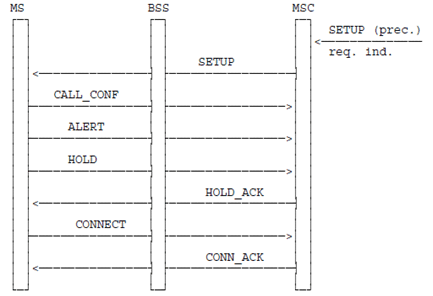
Figure 6: Signalling information required for the called-party pre-emption in case of an existing telephony call and subscription for HOLD
(⇒ copy of original 3GPP image)
(⇒ copy of original 3GPP image)
Call Waiting should always be subscribed together with eMLPP. If not, no called party pre-emption is possible for point-to-point calls.
SETUP (prec.) req. ind.:
In addition to the basic call requirements, the contents of the set-up information flow shall contain the information on the requested MLPP priority level.
SETUP:
Modified SETUP message with an indication of the priority level.
CALL_CONF:
Standard message with cause user busy.
On reception of the SETUP message a compatible Mobile Station decides on called party pre-emption. If called party pre-emption applies, the Mobile Station shall automatically accept the waiting call and put the other call on hold.
A non compatible Mobile Station shall not be harmed by the priority information and shall perform Call Waiting functions as normal.
ALERT:
Standard message. ALERTING may be omitted in case of called party pre-emption.
HOLD:
Standard message.
HOLD_ACK:
Standard message.
CONNECT:
Standard message.
CONN_ACK:
Standard message.
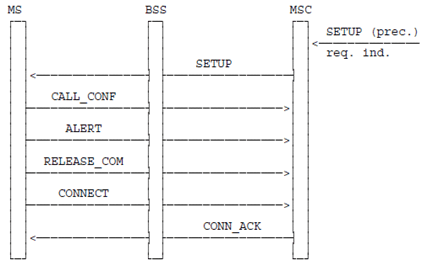
Figure 7: Signalling information required for the called-party pre-emption in case of point-to-point data calls or no subscription for HOLD
(⇒ copy of original 3GPP image)
(⇒ copy of original 3GPP image)
Call Waiting should always be subscribed together with eMLPP. If not, no called party pre-emption is possible for point-to-point calls.
SETUP (prec.) req. ind.:
In addition to the basic call requirements, the contents of the set-up information flow shall contain the information on the requested MLPP priority level.
SETUP:
Modified SETUP message with an indication of the priority level.
CALL_CONF:
Standard message with cause user busy.
On reception of the SETUP message a compatible Mobile Station decides on called party pre-emption. If called party pre-emption applies, the Mobile Station shall automatically accept the waiting call and clear the existing data call.
A non compatible Mobile Station shall not be harmed by the priority information and shall perform Call Waiting functions as normal.
ALERT:
Standard message. ALERTING may be omitted in case of called party pre-emption.
RELEASE_COM:
Standard message which shall be send immediately after the ALERT with a new cause for called party pre-emption.
CONNECT:
Standard message.
CONN_ACK:
Standard message.